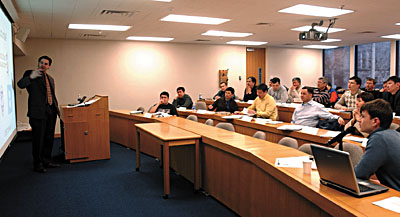 | SOM Professor Jonathan Koppell leads a class of Kazakhstan officials as part of a program designed to enhance their managerial skills. |
Senior policymakers from the Republic of Kazakhstan attended an executive training program held March 7-19 at the School of Management (SOM).
The program was designed to enhance the managerial skills of the government officials responsible for leading Kazakhstan's economic growth and social policy. The 25 member delegation included the vice-ministers of economy, industry and trade, finance, energy, agriculture, transport and communication, justice, education and science, healthcare, labor and social protection, as well as department heads and committee chairs in the Chancellery of the Prime Minister.
This was the first time such a large group of high-profile Kazakhstani leaders have visited the United States for executive development.
SOM created the program at the request of the Kazakhstan Agency for Civil Service Affairs. The sessions, taught by SOM and other Yale and visiting faculty, addressed topics that included improving the competitiveness of the country, modernizing the public administration system and civil service, development economics and globalization, and international trade.
The delegates also took trips to Washington, D.C. for presentations by the World Bank Institute and the Government Accountability Office, and a reception hosted by Kanat Saudabayev, Kazakhstan ambassador to the United States; and to Hartford for a discussion of electronic government at the state capitol.
"Kazakhstan is an important emerging economic power," says Manjula Shyam, director of international and special programs at SOM. "They have tremendous petroleum and mineral resources which are currently the mainstay of their economy. The program that we customized for them emphasized the knowledge and skills they will need as they work to develop and diversify their economy into other sectors to stimulate growth."
Kazakhstan, which gained independence from the former Soviet Union in 1991, is the largest country in Central Asia, equivalent in size to all of Western Europe. It is noted for its abundance in oil -- with reserves comparable to that of Kuwait -- and other natural resources. Major social and economic reforms enacted since its independence, combined with its vast oil resources, have resulted in Kazakhstan's economy growing at a steady pace of almost 10% in the last five years. Most notably, Kazakhstan holds the distinction of being the only country to disarm its nuclear arsenal (the fourth largest in the world).
More information about SOM's Executive Programs is available online at www.mba.yale.edu/executive_programs/default.asp.
T H I S
SOM hosts government leaders from Kazakhstan W E E K ' S
W E E K ' S S T O R I E S
S T O R I E S![]()
 Center renamed in honor of its founder
Center renamed in honor of its founder![]()
![]()
 Study: Benefits of red wine due to more than just alcohol
Study: Benefits of red wine due to more than just alcohol![]()
![]()
 STDs high even in teens who take virginity pledges
STDs high even in teens who take virginity pledges![]()
![]()
 Health care providers can learn valuable lessons from TB . . .
Health care providers can learn valuable lessons from TB . . .![]()
![]()
 Three physicists named to endowed posts
Three physicists named to endowed posts Michel Devoret: Beinecke chair in applied physics
Michel Devoret: Beinecke chair in applied physics![]()
 Steven Girvin: Higgins professorship in physics
Steven Girvin: Higgins professorship in physics![]()
 A. Douglas Stone: Morse chair in applied physics
A. Douglas Stone: Morse chair in applied physics![]()
![]()
 Economist appointed to Beinecke chair
Economist appointed to Beinecke chair![]()
![]()
 SOM hosts government leaders from Kazakhstan
SOM hosts government leaders from Kazakhstan![]()
![]()
 Yale-developed brace heading for market
Yale-developed brace heading for market![]()
![]()
 New York Times columnist to give next Poynter Fellowship Lecture
New York Times columnist to give next Poynter Fellowship Lecture![]()
![]()
 International group of scholars to probe 'Why Literature Matters'
International group of scholars to probe 'Why Literature Matters'![]()
![]()
 Conference will explore the global flow of information
Conference will explore the global flow of information![]()
![]()
 Discussion will examine legal rights of victims of genocide, torture
Discussion will examine legal rights of victims of genocide, torture![]()
![]()
 Divinity School event to tackle the 'Sunday-Monday disconnect'
Divinity School event to tackle the 'Sunday-Monday disconnect'![]()
![]()
 Software being developed by the Peabody's BioGeomancer project . . .
Software being developed by the Peabody's BioGeomancer project . . .![]()
![]()
 Study: High-risk treatments best for some breast cancer patients
Study: High-risk treatments best for some breast cancer patients![]()
![]()
 Richard Siken is selected as new Yale Younger Poet
Richard Siken is selected as new Yale Younger Poet![]()
![]()
 With short training program, ER workers can intervene with . . .
With short training program, ER workers can intervene with . . .![]()
![]()
 Yale Books in Brief
Yale Books in Brief![]()
![]()
 Jeffrey Kenney appointed chair of astronomy department
Jeffrey Kenney appointed chair of astronomy department![]()
Bulletin Home |
| Visiting on Campus
Visiting on Campus |
| Calendar of Events
Calendar of Events |
| In the News
In the News![]()
Bulletin Board |
| Classified Ads
Classified Ads |
| Search Archives
Search Archives |
| Deadlines
Deadlines![]()
Bulletin Staff |
| Public Affairs
Public Affairs |
| News Releases
News Releases |
| E-Mail Us
E-Mail Us |
| Yale Home
Yale Home